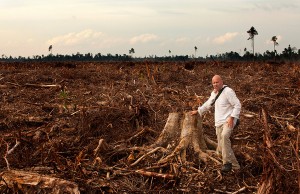
On July 15th and 16th at an upscale resort off the coast of Bali, executives from some of the companies that represent the two main threats to the survival of orangutans, deforestation for pulp & paper and palm oil expansion, converged with Indonesian and Malaysian government officials as well as NGOs. The topic of discussion? “Man of the Forest: Orangutan and the Future of Humanity.” As Deborah Bassett writes in her moving report back on the conference, this highly sophisticated species whose DNA is 97 percent similar to homo sapiens will be the first great ape to become extinct if urgent action is not immediately taken.
The outcome of the international stakeholders conference organized by the Indonesian Forestry Ministry is representative of the major challenges associated with protecting Indonesian rainforests and the fragile species depending on their health for survival. Corporate executives won’t make concrete commitments in favor of business as usual. Meanwhile, environmental, human and animal rights activists are rallying stronger than ever to turn the tides for the fate of the forests by releasing powerful investigative reports calling out companies and through direct action. But instead of acknowledging the role their industry plays in destruction and addressing concerns head-on, marketing bodies for the palm oil & paper industry have tended to expend efforts on denial and greenwashing as Rhett Butler beautifully highlights in his recent article:

“Yusof Basiron, CEO of the Malaysian Palm Oil Council — the government-backed marketing arm of the Malaysian palm oil industry — has gone so far as to claim that endangered orangutans benefit from living in proximity to oil palm plantations. Environmentalists scoff at the notion, maintaining that oil palm expansion is one of the greatest threats to orangutans.”
The looming issue of how we’re going to implement safeguards for the protection of Indonesia’s remaining forests, forest peoples & endangered wildlife is a hot topic these days, as the clock ticks and the sands of time run out. At another recent convergence, the Oslo Climate and Forest Conference, government officials devised the Indonesia-Norway Agreement that offers the hope of a two-year moratorium on deforestation, devised to keep the remaining forests intact, but even such proposals are too weak to ensure the fate of orangutans. Why? The palm oil industry will be allowed to continue business as usual. As Norman Jiwan of Sawit Watch wrote in a powerful Jakarta Post opinion piece, “there are already around 26.7 million hectares of land for oil palm plantations in 23 provinces that will be exempted from the two year moratorium.” Too little too late?

“Unfortunately, patience is something that these gentle forest dwellers may not be able to afford much longer,” reports Deborah Bassett. “Every minute, an area of forest the size of ten football fields is lost in Indonesia with wild orangutans disappearing at a rate of 2,000 per year. In a 2007 United Nations report, ‘The Last Stand of the Orangutan: State of Emergency,’ orangutans were given a sentence of 5 years before extinction in the wild.”
So, what are you going to do? Now more than ever, we need you in this fight. What’s at stake is too important. I urge you to please join us and take action before it’s too late!